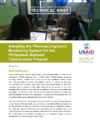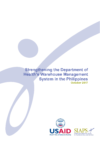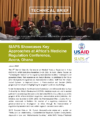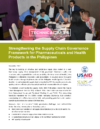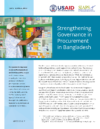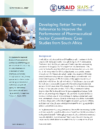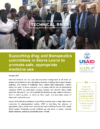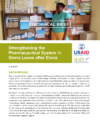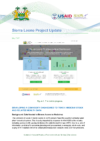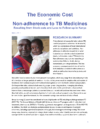The Department of Health-Pharmaceutical Division (DOH-PD) and National TB Program (NTP) in the Philippines adopted the web‐based application Pharmacovigilance Monitoring System (PViMS) to ensure systematic data collection and simplify the analysis of medicine safety information. PViMS is a free web tool developed by SIAPS to help clinicians, regulatory bodies, and implementing partners monitor medicine safety, … Read more
The goal of warehouse operations is to satisfy client needs and requirements while effectively utilizing space, equipment, and labor. Warehouse management refers to the monitoring, control, and optimization of warehouse and transportation systems. The objectives of this assessment were to review the existing warehouse management system, including space, equipment, tools, and processes, and identify key requirements … Read more
Assessment, C Agaceta, C Desano, E Nfor, I Linatoc, Philippines, Procurement, Supply chain management, Technical Brief, Technical Report, warehousing
The 3rd Biennial Scientific Conference on Medical Products Regulation in Africa (SCOMRA), which took place November 27–28, 2017, in Accra, Ghana, focused on “Sustaining the Momentum for Regulatory Harmonization in Africa.” Participants and presenters shared their experiences and lessons learned to contribute to the future of medical products regulation and harmonization in Africa. Staff from … Read more
The Systems for Improved Access to Pharmaceuticals and Services (SIAPS) Project, funded by the US Agency for International Development, helps countries promote access to safe, quality, and cost-effective pharmaceuticals and health commodities by using a system strengthening approach that engages stakeholders, builds and strengthens existing health systems, or establishes a new one, if necessary. SIAPS … Read more
Despite being one of the most densely populated countries in the world, the overall health in Bangladesh has steadily improved over the last 30 years. While the Government of Bangladesh’s efforts have resulted in impressive gains in public health, weaknesses in pharmaceutical management, including logistics and supplies, infrastructure, and the low performance of health care providers, … Read more
In South Africa, there are numerous governance structures that make crucial decisions about selection, procurement, distribution, and use of medicines, diagnostics, and other pharmaceutical products. A challenge commonly encountered is that critical committees either do not exist or where the committee is in place, it does not function optimally. One of the most underlying causes … Read more
Irrational medicine use and poor pharmaceutical management at all levels are widespread problems in many developing countries, including Sierra Leone. Misuse, underuse, and overuse of medicines; weak systems that compromise medicine safety; the waste of scarce resources due to expiry; and the rise of antimicrobial resistance (AMR) are particularly worrying because they directly affect health … Read more
SIAPS received two years of funding from the U.S. Agency for International Development (USAID) in September 2015 to provide technical assistance to rebuild and strengthen the post-Ebola pharmaceutical supply chain management system and improve the supply chain and rational medicine use in Sierra Leone. To support these goals, SIAPS provides technical assistance for systems strengthening activities … Read more
To take systems strengthening support to the next level, SIAPS is introducing a web-based enhanced information graphic display platform. The dashboard features data from each health facility and supply structure and will provide real-time access to patient and commodity information. The end goal is for the dashboard to be used to visualize graphic data on health programs, … Read more
One of the key elements of successful tuberculosis (TB) control programs is adherence to treatment, which is a cornerstone of most international and national policies and guidelines. Non-adherence results in increased length and severity of illness, death, disease transmission, and drug resistance. Treatment interruption is often due to patient-related factors—classed as loss to follow-up (LTFU)—but … Read more
